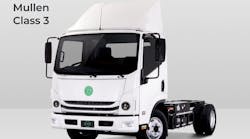In its first year of operations in southwest Florida, J.J. Taylor Distributing, Ft. Myers-Naples Inc. has made a lot of headway in setting up its beer distribution business. On the fleet side, the first order of business has been to map out a plan for converting the older beverage trucks it acquired from a previous distributor to new units that will be traded at regular intervals.
Jose Rivera, vp-operations, plans to convert the entire fleet to 100% Peterbilt by 2004. With an 8,500-sq.-mi. territory to cover, he says J.J. Taylor needs fleet equipment it can count on to meet customers' delivery requirements.
“The Peterbilt 330 model is very well suited for beverage delivery applications. It has the power, ease of handling and visibility our drivers need to maneuver on city streets and in tight delivery areas, and the trucks are very efficient to operate in terms of cost per mile,” Rivera states.
J.J. Taylor Distributing, Ft. Myers-Naples serves 2,850 customers ranging from convenience stores and supermarket chains to on-premise accounts, including restaurants and bars. Franchises are held with a number of major beer suppliers to sell and distribute their brands in eight counties in southwest Florida.
J.J. Taylor Distributing, Ft. Myers-Naples is the product of a consolidation of two distributorships J.J. Taylor companies purchased last year — one in Sarasota and one in Ft. Myers. Rivera says one of the first priorities was to consolidate the two warehouses it acquired into one, located in Ft. Myers, which is also the company's headquarters. Over the next year, his division will be replacing the building with a state-of-the-art facility that will also house maintenance operations.
“We've got the land under contract and are now in the process of getting permits to build on it,” Rivera explains. “Along with the two warehouses, we also acquired a lot of older fleet equipment from one of the former distributorships. We're currently replacing those power units with Peterbilts. To date we have bought 30 Peterbilt tractors, including 330, 385 and 378 models.
“Our goal is to get all power units on a six- to seven-yr. trade cycle,” Rivera continues. “The key to that is putting uniform mileages on all the trucks. Since some routes take them greater distances than others, we're putting together a rotation plan for the equipment that will prevent certain units from accumulating excessively high mileages and help us avoid having to perform frequent or major repairs on those trucks during their lifecycle.”
J.J. Taylor's diverse customer base dictates different methods of beer distribution, so a variety of fleet equipment is required. For example, 28- to 40-ft. bay trucks with roll-up doors on the sides are used to make deliveries to convenience stores like 7-11 and Circle K. Bulk deliveries to grocery stores are made in 45-ft. Great Dane trailers. More specialized equipment, called beer tenders, are used to deliver kegs of beer to on-premise accounts. These lowboy trailers also need to be refrigerated.
J.J. Taylor employs 55 drivers to cover its 53 delivery routes. Deliveries are almost always scheduled on a next-day basis from when an order is placed.
The company uses Roadnet Technologies routing software from UPS Logistics Group to schedule a driver's route the night before delivery. Sales staff, drivers, delivery personnel and warehouse workers communicate with each other via Nextel radios.
“We have three full-time mechanics,” Rivera advises, “and we do all our own vehicle maintenance in-house. Since we're such a young company, our fleet program is not yet fully up to speed, but one of the things we have done is set up a tire service program with Goodyear, which is now our sole provider of tires. In the future we will be setting up similar programs with other component suppliers that will help us keep maintenance and operating costs down.”


